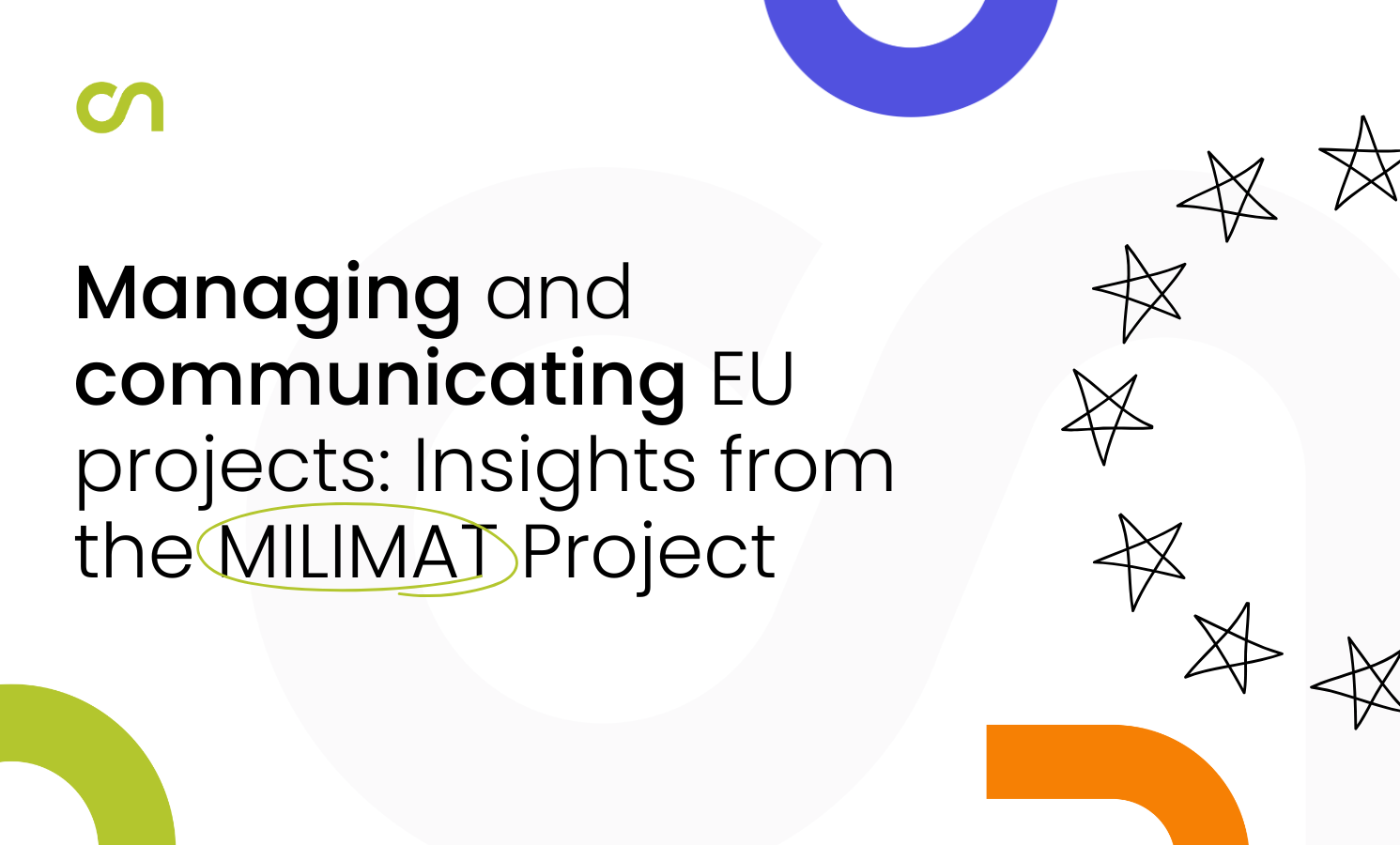
European funding programmes may appear technical and bureaucratic at first. However, behind the acronyms are people and organisations working together to deliver tangible benefits. Over the last decade, our team at OnProjects has helped consortia navigate this landscape, supporting them with everything from shaping proposals to delivering communication activities. Rather than presenting theory, we believe that real-life examples are the best way to illustrate how good management and communication translate into results.
One such example is MILIMAT, an Erasmus+ Cooperation partnerships in vocational education and training project that we supported from conception to completion, and which was led by the Italian farmers’ association CIA Umbria. While the topic addressed the integration of migrant workers into multicultural agricultural teams, the processes involved in securing funding, coordinating an international partnership, and communicating results are relevant to anyone working on European projects.
MILIMAT set out to help rural entrepreneurs, farmers and migrant workers to build teams based on mutual understanding and respect.
This article looks at how we contributed to turning this vision into a recognised good practice and shares lessons for other professionals in the EU funding ecosystem.
Understanding the starting point
Even before the initiative was backed by Erasmus+, the idea had already taken root in Spain. The regional farmers’ union, COAG Jaén, identified the need for training and tools to help rural entrepreneurs, farmers, and migrant workers build multicultural teams. MILIMAT therefore aimed to develop training materials and a digital platform that could overcome language, cultural and technological barriers.
The challenges were not trivial. Many seasonal workers are recruited informally and may not speak the local language. Agricultural employers often have little time for complex registration processes or training courses. Our role was to translate these realities into a coherent work plan that evaluators would recognise as both ambitious and feasible.
Laying the foundation: drafting the proposal
The proposal stage sets the tone for any EU-funded project. OnProjects worked closely with COAG Jaén and the wider consortium to develop the application. Our team reviewed the narrative, ensured that the needs analysis was evidence-based and took responsibility for the administrative and submission procedures. By relieving the partners of these tasks, we enabled them to focus on the project’s technical vision, while ensuring compliance with Erasmus+ requirements and maintaining logical coherence across the work plan.
The chosen approach was to centre the project on developing a user‑friendly digital platform. This wasn’t just a website; it was intended to be an interactive training environment comprising e-learning modules, a database of case studies and a collaborative space where farmers and migrant workers could exchange experiences. Our experience in the sector has shown us that effective communication and dissemination are increasingly vital for the success of EU projects, so we ensured these elements were embedded into the project design from the outset. This approach not only improved the quality of the outputs but also helped maximise the project’s visibility and impact.
Coordinating across borders
Successful consortia depend on trust and clear communication. Throughout the MILIMAT implementation, our team supported coordination by organising meetings, maintaining schedules, and monitoring quality. In practice, this involved setting up internal communication channels, sending out detailed agendas before each meeting, and taking concise minutes of the decisions made, which were shared with all partners. Acting as a trusted coordinator, we enabled the lead organisations to focus on the content, while ensuring that timelines and deliverables were met. Drawing on our management experience, we anticipated and avoided typical pitfalls and contributed to the project’s smooth progress.
Building the digital platform and training system
At the heart of MILIMAT was its training platform. In collaboration with subject-matter experts from the consortium, we produced a summary report, a set of case studies, and several training modules. These covered topics such as intercultural communication, labour rights and team building. All these materials were hosted on a digital platform developed by OnProjects. The platform’s design balanced visual appeal with ease of use, and we ensured full compatibility across devices and languages. Alongside the e-learning space, we developed a collaborative platform that connects employers with migrant workers, enabling them to share opportunities and experiences.
Communication, dissemination and long‑term impact
From the outset, we knew that a project dealing with migration and agriculture needed careful communication. OnProjects therefore led the communication and dissemination activities, creating a coherent visual identity, multilingual materials and an outreach strategy that continued beyond the project’s official end date. We produced promotional materials, social media content and newsletters tailored to farming communities and migrant support organisations. While this commitment to extending dissemination beyond the project’s end is unusual for a small-scale project, it aligns with our philosophy: results should live on and serve the community.
This approach bore fruit in several ways:
- The EU CAP Network, through its Thematic Group on Nurturing Agricultural Skills for a Thriving and Sustainable Agricultural Sector, selected MILIMAT as a good practice case for fostering agricultural skills. This recognition is significant because it places the project among a select number of examples promoted by the European Commission as models for others to follow.
- The consortium’s manual of good practices was published on the Food and Agriculture Organization of the United Nations’ Family Farming Knowledge Platform, giving the project a global audience.
- The Embassy of Colombia to the FAO expressed interest in the materials developed under the MILIMAT initiative, particularly the summary report, and reached out to the consortium to explore potential opportunities for collaboration to further promote and apply the project’s results.
These achievements demonstrate the power of effective communication and compelling materials in expanding a project’s reach beyond its initial target group.
Evaluation and recognition
The final evaluation is the ultimate test for an EU-funded project. MILIMAT received the Good Practice label from its funding body and achieved the maximum possible score in every single work activity, making it a clear success. This distinction is awarded only to projects that meet the highest standards of relevance, quality, management and impact. MILIMAT’s score of 100 out of 100 reflects not only the consortium’s hard work, but also the effectiveness of the management and communication framework that was put in place.
Lessons learned for future projects
Working on MILIMAT reinforced several lessons that we apply in all our projects.
- Firstly, effective coordination and communication within the consortium are essential for achieving excellence. This project showed that clear roles, agile decision-making and continuous quality monitoring help to ensure that all partners stay aligned and deliver results on time to a high standard.
- Secondly, user experience matters. A sophisticated tool is useless if people cannot access it or find it confusing. Investing in professional design and user testing encouraged uptake and proved worthwhile.
- Finally, communication must be integrated throughout the project life cycle. The recognition from the EU CAP Network and the FAO demonstrates how consistent branding, storytelling and outreach can increase impact. Although not always feasible, extending dissemination activities beyond the end of the project can significantly increase its visibility and long-term value.
MILIMAT shows what can be achieved when a consortium combines a clear social mission with rigorous project management and strategic communication. For OnProjects, it has been an opportunity to demonstrate our expertise in proposal drafting, coordination, web development, design and dissemination — all while working towards a cause we believe in. We are proud that the project has not only met all its objectives but has been recognised as a good practice by the Erasmus+ programme. Even more importantly, the tools and knowledge developed are now benefiting organisations beyond the original partnership.
If you’re thinking of starting your own project, we hope that the MILIMAT experience will inspire you. By focusing on solid project planning, strong collaboration, effective communication and a commitment to sustainability, you can drive lasting change. And if you are looking for a partner to manage your EU project or to handle its communication and dissemination, we would love to hear from you and explore how we could work together.
